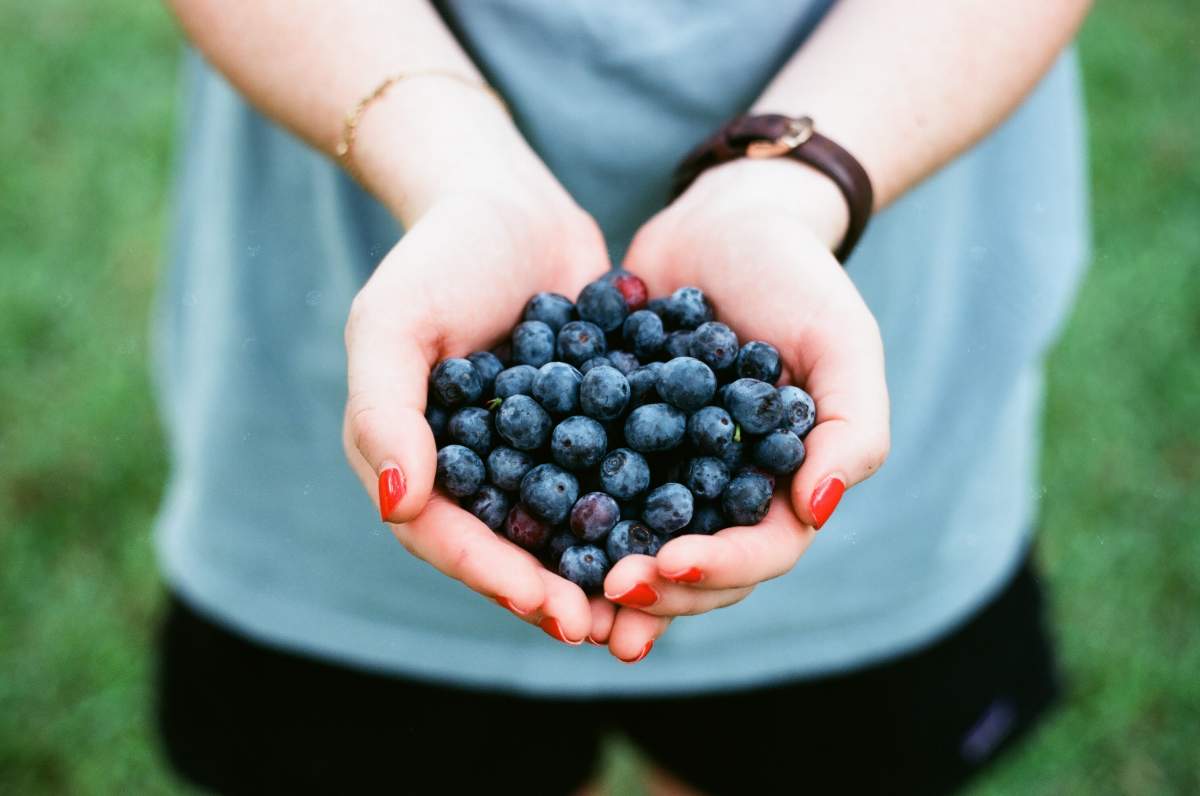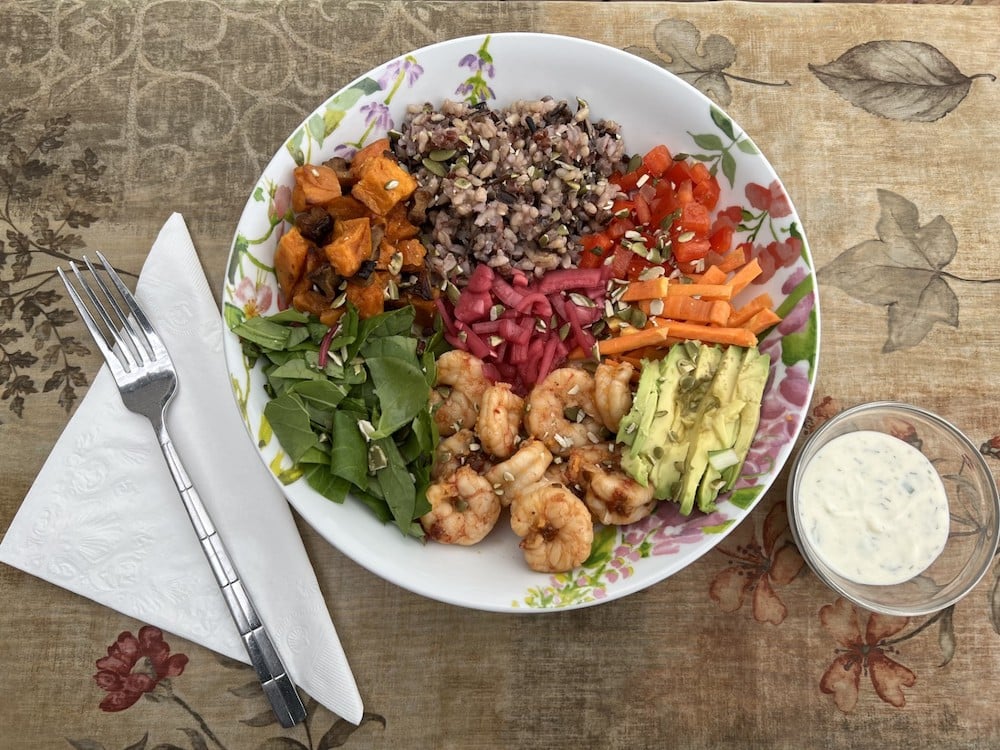
Share this post!
Summer is in full swing, and the berries are ripe. Sitting back with a bowlful of fresh berries on a warm summer day is one of life’s sweet pleasures. Just the thought of it might be enough to make you smile. While the act of eating juicy summer berries is inherently delightful, there may be a scientific explanation for why berries—and especially blueberries support a healthy mood.
Blueberries contain a high concentration of plant compounds called flavonoids. The specific flavonoids that give blueberries their deep bluish hue are called anthocyanins. These magical plant compounds are known for their antioxidant, anti-inflammatory, and other health benefits.
Given that blueberry anthocyanins are known to support brain health, researchers in the United Kingdom set out to explore whether blueberries would also influence mood. They tested the effects of a wild blueberry drink on mood in children and young adults. The results of the study were published in the journal Nutrients.
Blueberries and Mood: The Study
The study to evaluate the effects of blueberries on mood was a double-blind, placebo-controlled trial. It involved 50 children (between the ages of 7 and 10 years old) and 21 young adults (between the ages of 18 and 21 years old).
The children and young adults came to a test center on three days. Each time, they took a baseline mood assessment and then drank either a wild blueberry drink or a placebo drink. They returned two hours later for a second mood assessment.
The wild blueberry drink provided a standardized quantity of anthocyanins (235 mg per serving) from freeze-dried blueberries.
The mood assessments evaluated changes in positive and negative mood. There were no significant changes in negative mood (like sadness, fear, or anger) in any of the groups. However, there were noteworthy changes in positive mood.
Both the children and the young adults reported a more positive mood after drinking the blueberry juice. The mood assessments showed that blueberry juice contributed to more joy, interest, and alertness. This was the first study to ever show that blueberries may indeed make people happy.
Food and Mood
Although the study described above was the first to assess the immediate effects of blueberry juice on mood, it was not the first to assess the effects of food on mood.
The Nurse’s Health Study found that older women who consumed more flavonoids in their diet had a lower risk of depression. This study relied on food-frequency questionnaires from more than 80,000 US women and then tracked them for ten years, evaluating for the onset of depression. This type of study cannot prove a causal connection between food and mood, but it does offer a large set of data from a well-designed study.
Another study that was similar to the Nurse’s Health Study came to the same conclusion. The Australian Longitudinal Study on Women’s Health found that higher consumption of fruit was associated with a lower risk of depression over the course of 6 years.
In children and adolescents, there is also evidence that food influences mood. A systematic review of 20 studies in this younger population concluded that healthy dietary patterns were associated with better mental health. Also, better behavior in adolescents has been associated with a higher intake of fresh fruits and green leafy vegetables.
Eating Blueberries for a Better Mood
It’s not clear how many blueberries you need to eat in order to reap the benefits of a better mood. The study that was done in children and young adults provided 235 mg of anthocyanins per serving. Anthocyanin content of fresh blueberries varies greatly, but an average amount is around 200 mg of anthocyanins per cup of fresh berries.
That means you might experience more joy and alertness merely by eating a single cup of fresh blueberries. You’ll also get 14% of your daily recommended intake of fiber, 25% of your daily recommended intake of vitamin C ,and 36% of your daily intake of vitamin K—all for a mere 84 calories.
READ MORE >> Nutrients of the Rainbow – Blue/Purple
Blueberry Recipes
If you’re looking for a variety of creative ways to enjoy blueberries this summer, try some of these healthy and delicious blueberry recipes:
- Blueberry Smoothie. Throw your berries in the blender with a banana, yogurt, and other nutritional boosts. Try out this smoothie recipe from Cookie + Kate.
- Blueberry Sorbet. You can make a refreshing sorbet with just a little bit of raw honey as a sweetener. Wow your kids and neighbors with this lemon blueberry sorbet from a Sweet Pea Chef.
- Blueberry Crisp. Summer berry crisp recipes are extremely forgiving. You can make modifications to reduce sugar, eliminate gluten, or go dairy-free. Try this healthy blueberry crisp recipe from Tasty.
The Bottom Line on Blueberries and Mood
The study that we reviewed in this blog post evaluated the effects of blueberry juice on mood in healthy children and young adults. Blueberries are not a treatment for depression, anxiety, or any other mental health disorder. If you struggle with mood problems, please seek out professional help.
That being said, there is little risk in eating blueberries to support a healthy mood. Blueberries are low in calories and high in nutrients. Enjoy them fresh through the summer and then frozen through the winter.
You might find yourself smiling a little wider.
Related reading…
How Happy People Survive the Dark Days of Winter
The Ultimate Seasonal Produce Guide: Nutrition Facts & Recipes
About the Author: Sarah Cook, ND, is an instructor at the Nutrition Therapy Institute. She is also the owner of ND Pen, providing branding, copywriting, and website design services for integrative healthcare practitioners. Connect with Sarah at www.ndpen.com.
Image: Handful of Blueberries by andrew welch is free for use by Unsplash
Share this post!


















